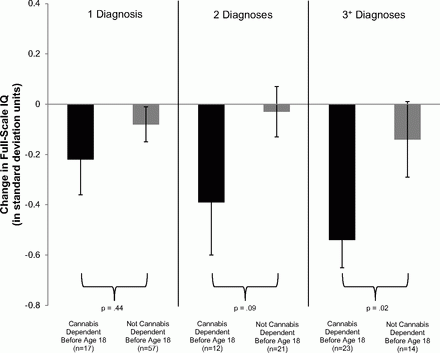Meier MH et al, reported in Proceedings of the National Academy of Sciences of the United States of America a prospective cohort entitled “Persistent cannabis users show neuropsychological decline from childhood to midlife.”
Research Question: The purpose of the present study was to test the association between persistent cannabis use and neuropsychological decline and determine whether decline is concentrated among adolescent-onset cannabis users.
Population: Participants (1,037) are members of the Dunedin Multidisciplinary Health and Development Study, a longitudinal investigation of the health and behavior of a complete birth cohort of consecutive births between April 1, 1972, and March 31, 1973, in Dunedin, New Zealand.
Intervention/observation: Cannabis use was ascertained in interviews at ages 18, 21, 26, 32, and 38 y. Neuropsychological testing was conducted at age 13 y, before initiation of cannabis use, and again at age 38 y, after a pattern of persistent cannabis use had developed. No drug testing or collaboration was done.

Results: Persistent cannabis use was associated with neuropsychological decline broadly across domains of functioning, even after controlling for years of education. Informants also reported noticing more cognitive problems for persistent cannabis users. Impairment was concentrated among adolescent-onset cannabis users, with more persistent use associated with greater decline. The decline was greatest in patients who had been diagnosed with “cannabis addiction disorder” and presented in the following table as a “diagnosis.”
Adolescent vulnerability. Shown is change in full-scale IQ (in SD units) from childhood to adulthood among study members with 1, 2, or 3+ diagnoses of cannabis dependence as a function of age of onset of cannabis dependence. Individuals with adolescent-onset cannabis dependence (black bars) experienced greater IQ decline than individuals with adult-onset cannabis dependence (gray bars). IQ decline of approximately −0.55 SD units among individuals with adolescent-onset cannabis dependence in the 3+ group represents a decline of 8 IQ points. Error bars = SEs.
Limitations: The limitations of this study are numerous and include potential alternative diagnoses resulting in IQ decline and not controlling for changes in socioeconomic status. In addition, self- reporting of cannabis use, as well as cannabis use in New Zealand in 1970’s, may not be a valid comparison to contemporary USA cannabis use and potency.
Conclusion: In this study, impairment was concentrated among adolescent-onset cannabis users, with more persistent use associated with greater decline. Further, cessation of cannabis use did not fully restore neuropsychological functioning among adolescent-onset cannabis users.
Persistent cannabis users show neuropsychological decline from childhood to midlife. Meier MH1, Caspi A, Ambler A, et al. Proc Natl Acad Sci U S A. 2012 Oct 2;109(40):E2657-64.
Link to source:

